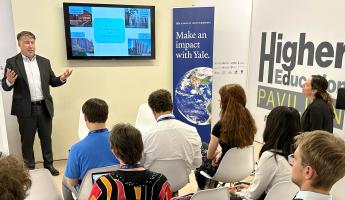
The Yale School of the Environment is sponsoring research by two Ukrainian scientists who are exploring how the war with Russia has impacted the country's environment. One research project is looking at the potential environmental damage caused by nuclear fallout from rocket attacks on the country’s nuclear power plants. The second examines how the war has affected environmental management, access to data, and environmental rights.
YSE’s sponsorship of the scientists is part of the Universities for Ukraine Non-Residential Fellowship Program, which matches Ukrainian researchers with colleges, universities, and research institutions worldwide that can provide funding for their work.

“The Universities for Ukraine Non-Residential Fellowship Program creates an opportunity for us to support these exceptional scholars at a time of tremendous hardship. Their work has never been more important, and I am very pleased that YSE, with the support of Dean Indy Burke, is able to participate,” says YSE Professor of Economics Matthew Kotchen, who brought the program to the attention of the School and Dean Burke.
Lesia Danyliuk, lecturer at Vasyl Stefanyk Precarpathian National University in Western Ukraine, is researching the impact of the war on environmental rights, management, and public access to environmental information. She is also exploring international, European, and Ukrainian legislation and court systems in the sphere of protections of environmental rights.

The Russian invasion of Ukraine that began in February 2022 has heightened concern about the increased risk of an accident in the country’s nuclear power plants. Oleg Skrynyk, senior researcher for the Ukrainian Hydrometeorological Institute, is assessing potential accidental radioactive emissions from attacks and loss of power at the country’s nuclear power plants, including the Zaporizhzhia Nuclear Power Plant (ZNPP) — the largest power plant in Europe which is currently occupied by Russian military forces. ZNPP, located in southern Ukraine, was captured by Russian forces on March 4 and has come under several rounds of shelling that has led to power outages. The plant is located in one of the four Ukrainian provinces that Russia announced that it annexed in November.
“Based on previous experiences with technological disasters involving nuclear power plants, including the Chernobyl and Fukushima accidents, it is obvious that this may lead to substantial radioactive contamination of the territory on a wide range of spatial scales along with transboundary radioactivity transport and deposition,” Skrynyk says.
His research will be based on numerical simulations of atmospheric transport, dispersion, and deposition of radioactive aerosol pollutants.
“The simulation of the atmospheric transport, dispersion, and deposition of radioactive particles using advanced meteorological and atmospheric dispersion models and software, which I plan to perform, may provide some critical information, which the authorities can use to mitigate the potential damage to the environment and public health,” Skrynyk says.
Danyliuk, whose home city of Ivano-Frankivsk in western Ukraine has also been hit by rocket attacks, says it is vital the country examines the impact of war on its natural resources.
“The environment has been a silent victim of this war,” she says.
War damage includes the loss of natural infrastructure, increased pollution from military attacks that leave rocket waste and other debris, and the disruption of conservation efforts in forests and waterways. Estimates of environmental damage in the Ukraine from the war have already reached $28 billion, Danyliuk says.
The environment has been a silent victim of this war.”
“Ukraine is rich in natural resources, and this is a war for our lands, our forests, our water. It is our motivation to save the environment for future generations,” Danyliuk says.
Critical to preserving and restoring the environment, she says, is access to data on the impacts of the war on the environment and how the conflict is disrupting the distribution of that information.
Danyliuk says the funding provided by YSE will help her publish her research data and take part in conferences. Skrynyk says the funding has been a lifeline for researchers struggling to continue their work. Many scientists, he says, have interrupted their research to join the military to defend the country.
“This grant is very important for me personally, not only as a form of financial support, but also as moral support,” Skrynyk says.
Published
December 2, 2022


